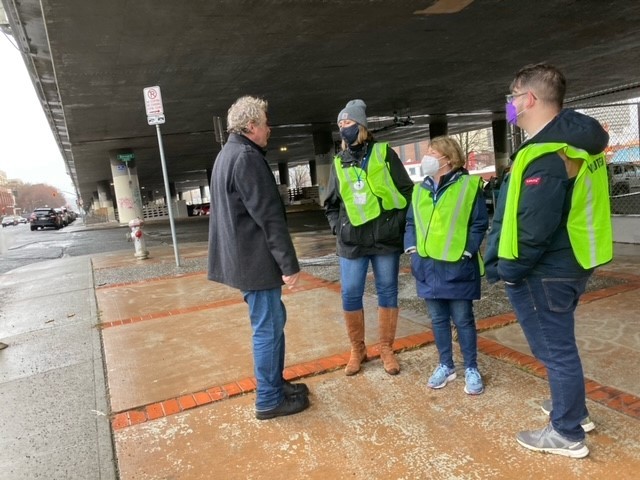A team of faculty and students from Eastern Washington University’s Urban and Regional Planning Program co-presented findings from their 10-month-long investigation into the root causes of homelessness at a July 13 community event. The presentation is now available online.
The team presented data-driven results, based on an analysis of interviews with 1,513 sheltered and unsheltered homeless people representing households of 1,757 people in Spokane County, along with supplemental research, at Spokane’s Central Library. (The Spokesman-Review recapped the public meeting in this July 14 article.)
The work was conducted as part of Eastern’s participation in Spokane’s annual Point-in-Time (PIT) Count, a county-wide census of persons without housing that aims to bring the homelessness issue into better focus. The presentation, held in nxʷyxʷyetkʷ Hall, included a panel discussion followed by a question-and-answer session.

Students worked hard on the presentation, creating a data gallery with charts and key graphics and coming prepared to answer questions.
“It has been an extraordinary experience for them,” says Matthew B. Anderson, associate professor and director of the urban and regional planning program, who oversaw Eastern’s involvement in the Point-in-Time count.
Nearly 40 members of the EWU community, including students, faculty and staff, volunteered their time to interview the homeless for the U.S. Department of Housing and Urban Development-mandated study.
Another half-dozen students took on administrative functions handling logistics, outreach and volunteer recruitment and then post-survey analysis, research and presentation.
Anderson, who holds EWU’s prestigious Jeffers W. Chertok Memorial Endowed Professorship, says the students learned vital skills while working alongside Daniel Ramos, a city data scientist, and Dr. Shiloh Deitz, a library community data coordinator, who will co-present with them on Wednesday.
The team hopes the project will educate the community about homelessness and spark conversations that lead to innovative solutions.
“A lot of the presentation will be about housing. That’s where the data has pointed and that’s consistent with what has been happening across the nation,” Anderson said. The panel will explore the link between a shortage of affordable housing and homelessness, a situation exacerbated by a widening gap between wages and housing costs.
In Spokane, a stressed-out housing market has sparked bidding wars that have pushed median house prices to all-time highs. In today’s market, officials say, Spokane residents earning $50,000 a year or less (some 40 percent of the city’s population) are effectively priced out of home homeownership. Those residents, in turn, are remaining in apartments, which is fueling historically low vacancy rates and pushing up rental rates.
This gap has caused Spokane County’s Housing Affordability Index to decline at an accelerated pace over the past two years. An index of 100 or above indicates households earn sufficient income to purchase a median-price home. During the first quarter of 2022, Spokane’s Affordability Index plummeted to below 80.
“The moment that line completely falls down is the very moment we see an uptick in the unsheltered homeless population,” Anderson said.
On June 14, students on Anderson’s research team searched available rental units on Zillow and found that the same 40 percent, or 86,000, of local households that couldn’t afford to purchase a home were also priced out of most rentals. Of the 325 units available, only 78 made the affordability cut for this population segment. Across the entire Spokane real estate market the team found only one unit that fit the affordability criteria for the 20 percent of residents earning the lowest wages.
The student group helping with the ongoing behind-the-scenes work includes graduate students Anna Staal, Graham Zickefoose, and Damalie Ndamira; Tony Newton, a recent graduate and intern; undergraduate students Tate Andrie, an intern, and political science major Jackie Leslie.
This fall, Ndamira, Staal, and Zickefoose will present the findings at the Annual Meeting of the Association of Collegiate Schools of Planning in Toronto, Ontario in Canada. In addition, Katie Gower, a political science major and McNair scholar, is doing a companion homeless study for her senior capstone project, one that Anderson hopes to publish.
Anderson’s team also plans to expand their research to include potential links between evictions and homelessness. In addition, the team hopes to use Spokane County records to create an eviction-tracking system, one that will help them quantify the extent to which landlords are evicting tenants as part of a “profit-driven” strategy.
The problem hits close to home, Anderson says, as two of his students recently told him they’d been evicted so landlords could sell properties. One, who had short notice and couldn’t find another place, was even sleeping in a car.
“People can be evicted for just being in the wrong place at the wrong time,” Anderson says.

